by M. C. Jennings | Nov 28, 2023 | Academics, Alumni Spotlight, COBA Faculty, College Decisions, Current Students, Economics, Faith Infusion, Social Entrepreneurship, Uncategorized
Written by special contributor Lance Fleming
Costa Rica, a small Central American country, is experiencing a significant increase in tourism. Travel officials in Costa Rica expect an unprecedented surge in tourists in 2023 and 2024. This country is famous for its national parks, rainforests, beaches, wildlife, and outdoor activities.
ACU students in the College of Business Administration have been traveling to Costa Rica since an initial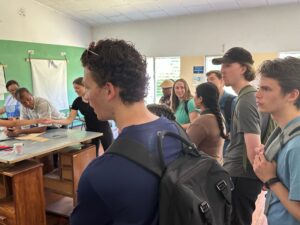 Central America Study Abroad trip with Dr. Mark and Dr. Laura Phillips in 2016. In 2018, they traveled to Turrialba, Costa Rica to visit CATIE, an agricultural university with a focus on economic development. In 2019, the first Social Enterprise Consulting class was offered and the partnership with CATIE began, focusing on economic development. But those students aren’t just in Costa Rica to observe. They are learning practical skills in research, marketing, and product creation from a class taught by Dr. Laura Phillips, Dr. Sarah Easter, Dr. Jennifer Golden, Dr. Mark Phillips, and Daniel Garcia. Currently, the class is working with local entrepreneurs to launch products made from materials donated by Southwest Airlines.
Central America Study Abroad trip with Dr. Mark and Dr. Laura Phillips in 2016. In 2018, they traveled to Turrialba, Costa Rica to visit CATIE, an agricultural university with a focus on economic development. In 2019, the first Social Enterprise Consulting class was offered and the partnership with CATIE began, focusing on economic development. But those students aren’t just in Costa Rica to observe. They are learning practical skills in research, marketing, and product creation from a class taught by Dr. Laura Phillips, Dr. Sarah Easter, Dr. Jennifer Golden, Dr. Mark Phillips, and Daniel Garcia. Currently, the class is working with local entrepreneurs to launch products made from materials donated by Southwest Airlines.
Dr. Mark Phillips and Garcia will teach the class next semester, and then Easter and Golden will teach a summer course. Students in each class will go over topics teaching them how to be a consultant, how to help without hurting, Costa Rican culture (both generally and in the business world), and some project-specific topics.
During Spring Break, the spring semester class will be in Costa Rica, and afterward, they will focus on completing their deliverable to the client for the rest of the semester. Dr. Laura Philips said the summer class will have a different format. It will include 5-6 weeks of online content on the same topics as in the spring. After that, students will spend nearly two weeks in Costa Rica to work on the project.
AACSB (the Association to Advance Collegiate Schools of Business) seeks to encourage all accredited schools to make a societal impact. As they state on their website, “AACSB’s vision of societal impact is that business schools contribute their specialized expertise to help mitigate some of society’s most pressing economic, social, human, and environmental problems.”
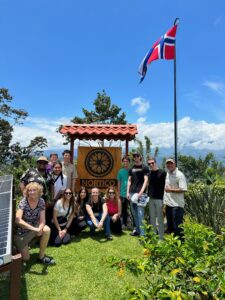 COBA was already seeking to make a broader societal impact through their programs. Now the Costa Rica activities are part of a broader COBA initiative. Dr. Laura Phillips said, “It’s exciting because AACSB is now asking us to do more of what we were already doing. The change isn’t to the consulting class. What’s different now is that we will have more activities (curricular, research, and engagement) focused on the same theme of Increasing Educational and Economic Opportunities for People in Marginalized Groups.”
COBA was already seeking to make a broader societal impact through their programs. Now the Costa Rica activities are part of a broader COBA initiative. Dr. Laura Phillips said, “It’s exciting because AACSB is now asking us to do more of what we were already doing. The change isn’t to the consulting class. What’s different now is that we will have more activities (curricular, research, and engagement) focused on the same theme of Increasing Educational and Economic Opportunities for People in Marginalized Groups.”
A five-person committee began meeting earlier this year to come up with a theme for the college’s work, Increasing Educational and Economic Opportunities for People in Marginalized Groups, and a tentative five-year plan.
“The plan includes curricular, research, and engagement objectives for our residential and online campuses,” Dr. Phillips said. “The Costa Rica class is one piece of this plan. We want the societal impact plan to provide opportunities for all interested faculty and staff to be involved, and that is part of the reason we are expanding the faculty who teach the consulting class. The plan also includes the development of additional partners for consulting projects. We are interested in developing a second international partner as well as cultivating a partnership closer to home.”
When Dr. Phillips first visited the CATIE campus with students in 2018, she connected with Dr. Eliecer Vargas, an economist at CATIE who specializes in economic development, which aligns well with the COBA students’ focus in Costa Rica.
Five years ago, students spent a few days exploring tourism startups by rural female entrepreneurs in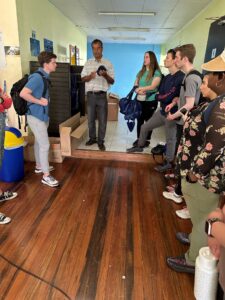 towns near Turrialba. After their trip, Dr. Phillips and Dr. Easter approached Vargas to discuss the idea of starting a consulting class and having the group of female entrepreneurs as their first client. Vargas agreed, and Dr. Phillips and Dr. Easter took their first group of consulting students to Costa Rica in the spring of 2019.
towns near Turrialba. After their trip, Dr. Phillips and Dr. Easter approached Vargas to discuss the idea of starting a consulting class and having the group of female entrepreneurs as their first client. Vargas agreed, and Dr. Phillips and Dr. Easter took their first group of consulting students to Costa Rica in the spring of 2019.
Southwest Airlines has served as the air provider for ACU’s program, transporting students and professors to and from Costa Rica, and in 2022, Southwest Airlines arranged a deal with CATIE to give the university seats from their refurbished planes.
The Turrialba region is now a major focus of Southwest’s investments. The company has set up a leatherworking shop on campus where local women and men can receive training and have access to leather and high-quality sewing machines with their support.
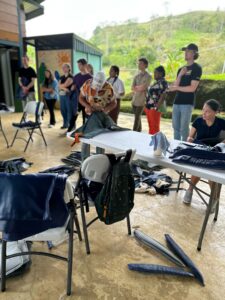 As part of Southwest Airlines’ “Repurpose with Purpose” program, each of the company’s fleet of airplanes is overhauled every four years, and as a part of that process, the seat leather is replaced. The leather pulled out of the planes is donated to nonprofit organizations for upcycling projects.
As part of Southwest Airlines’ “Repurpose with Purpose” program, each of the company’s fleet of airplanes is overhauled every four years, and as a part of that process, the seat leather is replaced. The leather pulled out of the planes is donated to nonprofit organizations for upcycling projects.
The idea is to create a business incubator to launch businesses as people graduate from the training program. Jobs are also being created in rural communities because CATIE receives intact seat covers that must be deconstructed before they are upcycled into new products.
And that’s where the ACU students enter the picture.
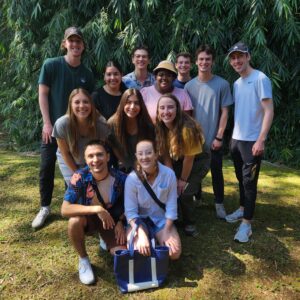 The students’ client is called Wearsos – the first business to come out of the leather project – and it was started by the husband-and-wife duo of Lynne Corvaglia and Chris Riquelme. Aside from upcycled bags, the company also plans to make other products like passport holders, wallets, luggage tags, and shoes.
The students’ client is called Wearsos – the first business to come out of the leather project – and it was started by the husband-and-wife duo of Lynne Corvaglia and Chris Riquelme. Aside from upcycled bags, the company also plans to make other products like passport holders, wallets, luggage tags, and shoes.
No two trips to Costa Rica have been alike, with the specifics of the project changing with every trip, usually at the request of the client. That means the specific business topics the students focus on vary.
“They always learn something from the business side of the project, although the bigger learning outcomes stem from the nature of cross-cultural consulting,” Dr. Phillips said. “The students have to stretch their problem-solving and critical-thinking skills and they have to do that in a group setting and not just on their own. Their flexibility and adaptability are put to the test every day we are there.
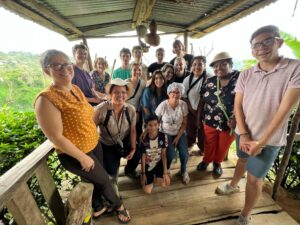 “They learn that other cultures may have different objectives and priorities for their business than what they usually see in the U.S., and they learn that the American measures of success are not the only measures,” she said. “They also learn that to provide useful recommendations for the client, they have to truly understand the client’s objectives and tailor their business solutions to meet the needs and the desires of the clients.”
“They learn that other cultures may have different objectives and priorities for their business than what they usually see in the U.S., and they learn that the American measures of success are not the only measures,” she said. “They also learn that to provide useful recommendations for the client, they have to truly understand the client’s objectives and tailor their business solutions to meet the needs and the desires of the clients.”
From the business skill side, Dr. Phillips said, the students have worked on market assessments and provided feedback based on the personas of different target customers. One class conducted focus groups to provide market research on potential products. Classes have researched logistics to help the client as they prepare to ship goods from Costa Rica to the US and Canada.
Other students created a comprehensive marketing plan (Instagram and Facebook posts, email campaigns,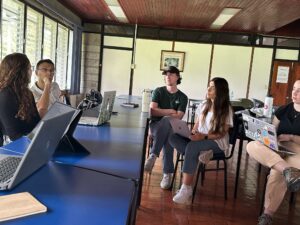 etc.) to help a client roll out a Kickstarter campaign. Students listened to entrepreneurs talk about current and future product ideas as well as where and how they intend to sell and then provided a comprehensive list of questions to each entrepreneur to help them think through and further develop their business plans.
etc.) to help a client roll out a Kickstarter campaign. Students listened to entrepreneurs talk about current and future product ideas as well as where and how they intend to sell and then provided a comprehensive list of questions to each entrepreneur to help them think through and further develop their business plans.
Dr. Phillips said proposed expansion plans for the program that have been discussed are for the Costa Rica consulting class to be offered twice each year: once in the spring and once in the summer with a variety of faculty involved in teaching the class. Dr. Phillips also said she would like to involve COBA alumni on the trip to provide their expertise in the project’s area of focus.
“That could be social media marketing, logistics, building basic business plans, finding funding sources, or rural development,” she said. “I also hope to continue our partnership with Southwest Airlines. It has been valuable to be working with their Repurpose with Purpose group because we can truly partner to support these clients.”
To learn more about the College of Business at ACU, click here.
by M. C. Jennings | Nov 2, 2023 | Academics, Accounting, Careers In..., COBA Events, COBA Faculty, COBA Staff, College Decisions, Current Students, Outcomes, Professional Development, Uncategorized
written by special contributor Lance Fleming
Each year, ACU’s College of Business Administration (COBA) graduates students ready to move into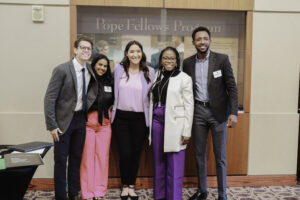 professional fields in numerous types of businesses at every level of an organization. Sometimes, it’s in a company run by an ACU alum who wants to help students at their alma mater secure employment. Other times, it’s a global brand looking for the best and the brightest employees.
professional fields in numerous types of businesses at every level of an organization. Sometimes, it’s in a company run by an ACU alum who wants to help students at their alma mater secure employment. Other times, it’s a global brand looking for the best and the brightest employees.
Whatever the case might be and whatever employers are looking for, more often than not, ACU graduates – and in particular, ACU COBA graduates – are usually at the head of the line when it comes to new hires each summer.
So it shouldn’t be surprising that more than 50 companies from across the state and Oklahoma were represented on Thursday, Oct. 5, for the first joint Career Fair sponsored by COBA and the Department of Engineering and Physics at the Hunter Welcome Center. COBA also has in-house career preparation led by Professional Development and Internship Director Jasmine McCabe-Gossett. Students also have access to the ACU Virtual Career Center with resources to help them create resumes and cover letters.
McCabe-Gossett (2010), who joined COBA last year, sensed a need for a Career Fair. After months of preparation, on October 5, that happened giving COBA students a chance to sit across from potential employers, put their resumes in front of them, and allow them to talk about themselves and what skills they would bring to an organization.
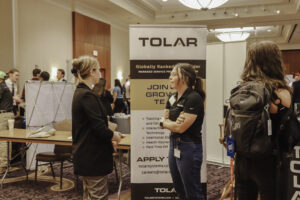 Various companies with both a local and international presence participated in the fair, providing our students with options that appealed to all. Business and technology students were able to engage with companies within the following industries: real estate, hospitality, IT services, consulting, distribution, financial services, sales, healthcare and more. One student noted, “I have never attended a career fair, but it was great! It was so cool to be able to see many different options in internships, companies, and people!”
Various companies with both a local and international presence participated in the fair, providing our students with options that appealed to all. Business and technology students were able to engage with companies within the following industries: real estate, hospitality, IT services, consulting, distribution, financial services, sales, healthcare and more. One student noted, “I have never attended a career fair, but it was great! It was so cool to be able to see many different options in internships, companies, and people!”
These companies weren’t just looking for full-time employees, either. Internships have become a way for companies to put a student and potential future employee through an on-the-job interview, a point McCabe-Gossett tried to drive home to some of her students going into the Career Fair.
“We want to connect students with employers, especially students looking for full-time employment,” she said. “But a considerable focus is to connect employers to potential interns. In the lead-up to the event, we hosted several different workshops to help students feel comfortable and confident, starting with a workshop focused on identifying personal values and what it looks like to live out your faith in the workplace authentically. We had a panel of professionals who came in and spoke about that.
“The Career Fair turned out to be geared more toward internships,” McCabe-Gossett said. “During this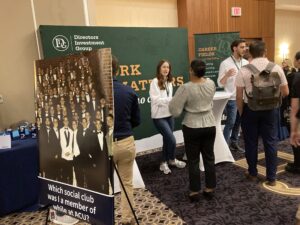 season, many companies are laying off employees, but we know it’s still strategically important to build a pipeline, and internships are a big part. I told the students not to dismiss the internship experience because it’s a great foundation\opportunity that can open doors for them. Some students were disappointed, but I tried to help re-frame their thinking regarding how you leverage an internship.”
season, many companies are laying off employees, but we know it’s still strategically important to build a pipeline, and internships are a big part. I told the students not to dismiss the internship experience because it’s a great foundation\opportunity that can open doors for them. Some students were disappointed, but I tried to help re-frame their thinking regarding how you leverage an internship.”
Another area where McCabe-Gossett and others helping her with the Career fair tried to re-form thinking centered around the experiences students might have working as interns or part-time workers at faith-based camps or events. While that experience fits neatly into the ACU experience, sometimes it doesn’t catch the eye of a potential employer, something McCabe-Gossett said she tried to help some students with as they prepare themselves to hit the job market.
“A lot of times, our students have faith-based experiences, so we talked about how to translate those experiences to a compelling resume and what values they can bring to the workplace,” she said. “Those are wonderful experiences, but we also want our students to be able to go toe-to-toe with anyone for any job. This is beyond talking about what you did but digging into how you did your job and the result.”
And this year’s success has McCabe-Gossett already thinking about the 2024 Career Fair.
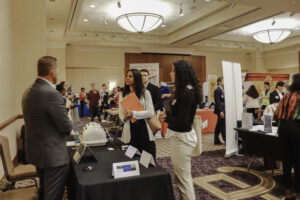 “We’ve had Meet the Firm Nights in the past, which was specific to accounting majors, and that’s wonderful,” she said. “But I wanted to cast a wider net this year and probably a wider one next year. It was a heavy lift, but I’m glad we did it because I now have this Career Fair to show potential employers. We have ACU alumni who are killing it in the business world, and they’re in positions of power, so why not ask them to come back here and represent their companies? I’m trying to create a playbook to present to alumni who work at Google or AT&T or wherever to help convince them they should come back here and represent their company at future events.”
“We’ve had Meet the Firm Nights in the past, which was specific to accounting majors, and that’s wonderful,” she said. “But I wanted to cast a wider net this year and probably a wider one next year. It was a heavy lift, but I’m glad we did it because I now have this Career Fair to show potential employers. We have ACU alumni who are killing it in the business world, and they’re in positions of power, so why not ask them to come back here and represent their companies? I’m trying to create a playbook to present to alumni who work at Google or AT&T or wherever to help convince them they should come back here and represent their company at future events.”
For more information on professional development in COBA, email Jasmine McCabe-Gossett at jcj05c@acu.edu.
by M. C. Jennings | Oct 19, 2023 | Academics, Careers In..., COBA Faculty, COBA Staff, College Decisions, Computer Science, Current Students, Faith Infusion, School of Information Technology and Computing, Student Spotlights
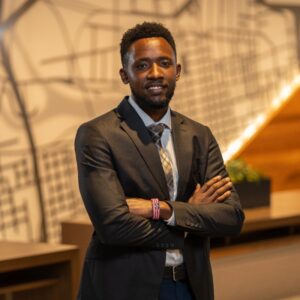 written by special contributor Lance Fleming
written by special contributor Lance Fleming
Fabrice Mpozenzi spent his summer internship working for JP Morgan Chase in Wilmington, Delaware, where he had the opportunity to get in on the ground floor of working on the front end and back end of web applications and other projects meant to further his understanding of the business.
The junior computer science major from Rwanda also worked on a business with a team of interns, which was eventually presented to senior executives for implementation. Mpozenzi’s internship fueled his desire to work as a software engineer after he graduates from ACU.
We recently caught up with Mpozenzi to get his insights on his summer internship and how ACU prepared him to work with JP Morgan Chase.
Q: What did you do in your internship?
Mpozenzi: “I had a chance to work on several different projects. I worked on a web application’s front and back end and presented it to a team of engineers, including my manager. I also had an opportunity to collaborate with other interns to work on a business plan project that we presented to senior executives.”
Q: What was your favorite part of the internship?
Mpozenzi: “What I loved most about my internship was the opportunity to shadow other teams to see the projects they were working on and learn from them. I also loved networking with different people at the company.”
Q: What are the most significant lessons you learned in your internship?
Mpozenzi: “The internship taught me two things: learning is a journey that never ends because there’s always going to be something new to learn, and one must stay hungry and motivated to learn new skills. I also learned that asking questions, especially in the workplace, is an art that unlocks knowledge and fosters a deeper understanding.”
Q: How do you see this experience aiding you in the future?
Mpozenzi: “It’s given me a roadmap to an industry that I would like to contribute to in the future, and I made connections with people from diverse backgrounds that I believe are going to be helpful in my future endeavors.”
Q: What are your plans after graduation?
Mpozenzi: “I plan to work with a Fintech company as a software engineer.”
Q: Do you have any tips for future interns or students looking for internships?
Mpozenzi: “I would tell students looking for internships to stay proactive and seek support from the professional development team. Also, stay informed about your industry, and once you secure an internship, make the most of the experience by learning and networking.”
Q: How has your time at ACU prepared you for this internship, employment, or graduate school after graduation?
Mpozenzi: “The academic coursework at ACU has equipped me with a solid foundation of knowledge and problem-solving skills relevant to my field. ACU’s professional development services, including resume workshops and interview coaching, have also helped me refine my professional presentation. These resources have prepared me for this internship and laid the groundwork for my post-graduation plans.”
Q: What’s been your most memorable experience as a business or technology student at ACU?
Mpozenzi: “My favorite thing about being a technology student at ACU is the supportive faculty and the vibrant student community that has created an environment where I can collaborate and engage in meaningful discussions with peers. ACU’s commitment to fostering a strong community has enriched my academic experience.”
by M. C. Jennings | Oct 10, 2023 | Academics, Careers In..., COBA Faculty, College Decisions, Current Students, Marketing, Outcomes, Professional Development, Student Spotlights, Student Spotlights, Uncategorized
Written by special contributor, Lance Fleming
When most people go to Arkansas in the summer, it’s to take advantage of some of the great outdoor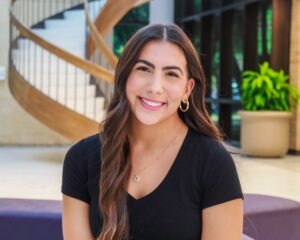 activities offered by “The Natural State,” such as fishing, kayaking and canoeing, exploring lakes and rivers, hiking, mountain biking, and visiting national parks and nature centers for which the state is known.
activities offered by “The Natural State,” such as fishing, kayaking and canoeing, exploring lakes and rivers, hiking, mountain biking, and visiting national parks and nature centers for which the state is known.
But Bryanna Monteiro spent her summer as an intern for the state’s most visible business: Walmart. Instead of spending her days outside enjoying what Arkansas offers, she was working inside on networking and connectivity. Her work paid off, however, as the senior marketing major from Orlando, Florida, earned an offer and accepted a job with Walmart that will begin after she graduates from ACU.
We recently caught up with Monteiro to get a sense of her internship and how ACU prepared her for her work in the summer and beyond.
Q: What did you do in your internship?
Monteiro: “I was a merchandising intern in Department 72: Networking and Connectivity. I was given a project over the summer: content quality score acceleration within our department. At the end of the internship, I presented the project to leadership, where I talked about my strategy for what items to remove, move, and improve.”
Q: What was your favorite part of the internship?
Monteiro: “All the valuable experience it gave me because of all the incredible people I met, from other interns to people who work internally at Walmart and external people Walmart works with. I feel like I learned so much from getting to hear others’ experiences as well as the wisdom they were able to share with me.”
Q: What are the most significant lessons you learned in your internship?
Monteiro: “The importance of progress over perfection and focusing on opportunities and growth rather than just the challenges that may arise with things out of your control. There is always more to do, and moving forward even when things don’t go to plan is essential.”
Q: How do you see this experience aiding you in the future?
Monteiro: “This was truly the most incredible experience because I learned to be confident in my abilities and skills without being afraid to share my input. I met so many amazing people who supported me but also challenged and pushed me so that I would grow both personally and professionally.”
Q: Is this job leading to full-time employment with Walmart? If not, what are your plans after graduation?
Monteiro: “Yes, it is! I will be moving to Bentonville, Arkansas, post-graduation.”
Q: Do you have any tips for future interns or students looking for internships?
Monteiro: “Do an internship!! I cannot stress this enough. I don’t believe there is such a thing as looking back and regretting not having done more internships. Be yourself and know what you’re passionate about/what you are good at so you can find the right fit for you. Connect with your professors and anyone you meet; that will be important when looking for opportunities. Finally, ensure you intern at a company you see yourself working at or are open to because it could lead to future opportunities, and you won’t waste your time.”
Q: How has your time at ACU prepared you for this internship, employment, or graduate school after graduation?
Monteiro: “My time at ACU prepared me for this internship/future post-graduation job because I am an individual rather than just a number at this school. My professors have supported and encouraged me in every aspect: in class and when I was preparing to take on this internship. All my courses have equipped me with the skills necessary to succeed in my role. ACU provided me with all the additional resources I could use when preparing.”
Q: What’s been your most memorable experience as a business student at ACU?
Monteiro: “The application side of every class I have taken because it allowed me to take what I am learning and use it in scenarios I may encounter later. I love COBA’s community aspect in that all the professors want you to succeed and are the biggest support system in helping you achieve your goals.”
by M. C. Jennings | Oct 3, 2023 | Academics, COBA Faculty, COBA Staff, College Decisions, Current Students, Management, Professional Development, Student Spotlights, Uncategorized
Written by special contributor, Lance Fleming
While millions worldwide spent part of their summer vacation enjoying the ocean and sea air while taking a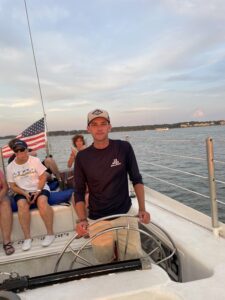 cruise, ACU junior business management major Dan Hastings spent his summer making sure some of those people had the time of their lives.
cruise, ACU junior business management major Dan Hastings spent his summer making sure some of those people had the time of their lives.
Hastings worked as an intern for Vagabond Cruise Lines during the summer and spent it based in Hilton Head, South Carolina, one of the busiest vacation spots in the country. We recently caught up with Hastings, a native of Westborough, Massachusetts, and got a rundown of his summer spent with Vagabond Cruise.
Q: What did you do in your internship?
Hastings: I worked with 12 other interns, serving guests daily through different roles. The main functions were food and beverage, reservations/back office, and on-the-boat work. Some days, I would work on the sailboat taking out trips, talking to guests, raising the sails, and other duties that needed to be performed on that boat, but the next day, I might work in the office handling reservations. The variety of this internship is what made every day new and exciting.
Q: What was your favorite part of the internship?
Hastings: My favorite part of the internship was living on the island and being on the water daily. I love the ocean, and the opportunity to spend my summer on it was incredible.
Q: What are the most significant lessons you learned in your internship?
Hastings: One of the biggest lessons I learned is that it’s OK to make mistakes as long as you learn and grow from them. I also learned a lot about teamwork and how crucial it is to have a cohesive team that you can rely on to achieve the organization’s goals.
Q: How do you see this experience aiding you in the future?
Hastings: Hospitality is my passion. I love serving others, and this internship was a way for me to practice and perfect how to have good interactions with guests and clients. That experience is what I’ll hold with me going into the future.
Q: Do you have any tips for future interns or students looking for internships?
Hastings: Don’t be afraid to try something new, even if you know little about it. I traveled across the country to a place I had never been to move in with people I had never met, and it turned into an incredible, unforgettable summer.
Q: How has your time at ACU prepared you for this internship and future employment?
Hastings: ACU has taught me so much about interacting with people professionally and casually. I’ve learned that through close relationships with friends and professors in the very welcoming ACU community. What an ACU student brings to the table is an attitude of gratitude and willingness to work hard, even if the work is exhausting or not what you enjoy.
Q: What’s been your most memorable experience as a business or technology student at ACU?
Hastings: The COBA faculty! They genuinely want what’s best for you and go out of their way to foster student success daily.
COBA seeks to develop connected, inspired, and equipped business and technology professionals who honor God and bless the world through:
-
- Distinctive programs
- Lifelong relationships
- Pathways for impact
To learn more about the College of Business at ACU, click here.
by M. C. Jennings | Sep 25, 2023 | Academics, Careers In..., COBA Faculty, COBA Staff, College Decisions, Current Students, Financial Management, Professional Development, Uncategorized
Written by special contributor, Lance Fleming
It probably doesn’t happen often that an intern working at an insurance company during the summer calls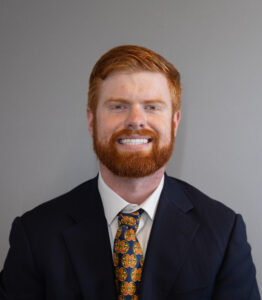 the best part of that internship the chance to improve his communication skills. But for ACU senior finance major Will Fargason, that was his favorite part of working during the summer for S-S Bendure Hartwig, one of the fastest-growing firms representing American Income Life branch of Globe Life Insurance.
the best part of that internship the chance to improve his communication skills. But for ACU senior finance major Will Fargason, that was his favorite part of working during the summer for S-S Bendure Hartwig, one of the fastest-growing firms representing American Income Life branch of Globe Life Insurance.
Based in Columbus, Ohio, S-S Bendure Hartwig has been one of the top workplaces in Columbus from 2013-21, as selected by Columbus CEO magazine. Fargason spent the summer working remotely, meaning most client interactions came via Zoom meetings. Not exactly the best way to communicate, but for Fargason, it helped him work on his interpersonal skills.
We recently caught up with the native of Lubbock to get some insights on his summer spent working as an insurance agent for S-S Bendure Hartwig.
Q: What was your favorite part of the internship?
Fargason: Being able to speak with the clients daily through Zoom calls. We communicated and tried to figure out the best possible plans for those people to be able to live their lives and not worry if they were to pass away, how their kids’ lives would be affected.
Q: What are the most significant lessons you learned in your internship?
Fargason: The greatest lesson I learned was not taking anything for granted. The conversations I had with clients and learning about their financial or physical situations reminded me how blessed I was to be in a position where I had a fantastic internship opportunity and could help other families find what was best suited for their needs at that time.
Q: How do you see this experience aiding you in the future?
Fargason: This experience will significantly help me in the future because, throughout this internship, I exponentially increased my communication skills. Talking to clients daily and through complex topics has helped my vocabulary and ability to catch different vocal cues to ensure I communicate as effectively as possible.
Q: Do you have any tips for future interns or students looking for internships?
Fargason: Apply for every internship that seems remotely interesting. I never knew exactly what I wanted to do, and being able to do an internship allowed me to see if this field was something I enjoyed and wanted to continue.
Q: How has your time at ACU prepared you for this internship and for future employment?
Fargason: My time at ACU has helped me through the various preparation applications they have provided me and throughout my classes, learning everything I would need to help me in the business world. Being taught by professors with their doctorates and at the highest level of education has been an enormous blessing for me to be prepped for life and work after college.
Q: What’s been your most memorable experience as a business student at ACU?
Fargason: The opportunity to grow professionally while still in school. The business school has many opportunities to meet high-class business people and learn everything you want about life after college. This opportunity to learn from people who have been successful in their fields and have chosen to come back to campus to share what worked for them and how we could be successful is something I’ve enjoyed.
COBA seeks to develop connected, inspired, and equipped business and technology professionals who honor God and bless the world through:
-
- Distinctive programs
- Lifelong relationships
- Pathways for impact
To learn more about the College of Business at ACU, click here.
 Central America Study Abroad trip with Dr. Mark and Dr. Laura Phillips in 2016. In 2018, they traveled to Turrialba, Costa Rica to visit CATIE, an agricultural university with a focus on economic development. In 2019, the first Social Enterprise Consulting class was offered and the partnership with CATIE began, focusing on economic development. But those students aren’t just in Costa Rica to observe. They are learning practical skills in research, marketing, and product creation from a class taught by Dr. Laura Phillips, Dr. Sarah Easter, Dr. Jennifer Golden, Dr. Mark Phillips, and Daniel Garcia. Currently, the class is working with local entrepreneurs to launch products made from materials donated by Southwest Airlines.
Central America Study Abroad trip with Dr. Mark and Dr. Laura Phillips in 2016. In 2018, they traveled to Turrialba, Costa Rica to visit CATIE, an agricultural university with a focus on economic development. In 2019, the first Social Enterprise Consulting class was offered and the partnership with CATIE began, focusing on economic development. But those students aren’t just in Costa Rica to observe. They are learning practical skills in research, marketing, and product creation from a class taught by Dr. Laura Phillips, Dr. Sarah Easter, Dr. Jennifer Golden, Dr. Mark Phillips, and Daniel Garcia. Currently, the class is working with local entrepreneurs to launch products made from materials donated by Southwest Airlines.  COBA was already seeking to make a broader societal impact through their programs. Now the Costa Rica activities are part of a broader COBA initiative. Dr. Laura Phillips said, “It’s exciting because AACSB is now asking us to do more of what we were already doing. The change isn’t to the consulting class. What’s different now is that we will have more activities (curricular, research, and engagement) focused on the same theme of Increasing Educational and Economic Opportunities for People in Marginalized Groups.”
COBA was already seeking to make a broader societal impact through their programs. Now the Costa Rica activities are part of a broader COBA initiative. Dr. Laura Phillips said, “It’s exciting because AACSB is now asking us to do more of what we were already doing. The change isn’t to the consulting class. What’s different now is that we will have more activities (curricular, research, and engagement) focused on the same theme of Increasing Educational and Economic Opportunities for People in Marginalized Groups.” towns near Turrialba. After their trip, Dr. Phillips and Dr. Easter approached Vargas to discuss the idea of starting a consulting class and having the group of female entrepreneurs as their first client. Vargas agreed, and Dr. Phillips and Dr. Easter took their first group of consulting students to Costa Rica in the spring of 2019.
towns near Turrialba. After their trip, Dr. Phillips and Dr. Easter approached Vargas to discuss the idea of starting a consulting class and having the group of female entrepreneurs as their first client. Vargas agreed, and Dr. Phillips and Dr. Easter took their first group of consulting students to Costa Rica in the spring of 2019.  As part of Southwest Airlines’ “Repurpose with Purpose” program, each of the company’s fleet of airplanes is overhauled every four years, and as a part of that process, the seat leather is replaced. The leather pulled out of the planes is donated to nonprofit organizations for upcycling projects.
As part of Southwest Airlines’ “Repurpose with Purpose” program, each of the company’s fleet of airplanes is overhauled every four years, and as a part of that process, the seat leather is replaced. The leather pulled out of the planes is donated to nonprofit organizations for upcycling projects.  The students’ client is called Wearsos – the first business to come out of the leather project – and it was started by the husband-and-wife duo of Lynne Corvaglia and Chris Riquelme. Aside from upcycled bags, the company also plans to make other products like passport holders, wallets, luggage tags, and shoes.
The students’ client is called Wearsos – the first business to come out of the leather project – and it was started by the husband-and-wife duo of Lynne Corvaglia and Chris Riquelme. Aside from upcycled bags, the company also plans to make other products like passport holders, wallets, luggage tags, and shoes.  “They learn that other cultures may have different objectives and priorities for their business than what they usually see in the U.S., and they learn that the American measures of success are not the only measures,” she said. “They also learn that to provide useful recommendations for the client, they have to truly understand the client’s objectives and tailor their business solutions to meet the needs and the desires of the clients.”
“They learn that other cultures may have different objectives and priorities for their business than what they usually see in the U.S., and they learn that the American measures of success are not the only measures,” she said. “They also learn that to provide useful recommendations for the client, they have to truly understand the client’s objectives and tailor their business solutions to meet the needs and the desires of the clients.”  etc.) to help a client roll out a Kickstarter campaign. Students listened to entrepreneurs talk about current and future product ideas as well as where and how they intend to sell and then provided a comprehensive list of questions to each entrepreneur to help them think through and further develop their business plans.
etc.) to help a client roll out a Kickstarter campaign. Students listened to entrepreneurs talk about current and future product ideas as well as where and how they intend to sell and then provided a comprehensive list of questions to each entrepreneur to help them think through and further develop their business plans.  professional fields in numerous types of businesses at every level of an organization. Sometimes, it’s in a company run by an ACU alum who wants to help students at their alma mater secure employment. Other times, it’s a global brand looking for the best and the brightest employees.
professional fields in numerous types of businesses at every level of an organization. Sometimes, it’s in a company run by an ACU alum who wants to help students at their alma mater secure employment. Other times, it’s a global brand looking for the best and the brightest employees.  Various companies with both a local and international presence participated in the fair, providing our students with options that appealed to all. Business and technology students were able to engage with companies within the following industries: real estate, hospitality, IT services, consulting, distribution, financial services, sales, healthcare and more. One student noted, “I have never attended a career fair, but it was great! It was so cool to be able to see many different options in internships, companies, and people!”
Various companies with both a local and international presence participated in the fair, providing our students with options that appealed to all. Business and technology students were able to engage with companies within the following industries: real estate, hospitality, IT services, consulting, distribution, financial services, sales, healthcare and more. One student noted, “I have never attended a career fair, but it was great! It was so cool to be able to see many different options in internships, companies, and people!” season, many companies are laying off employees, but we know it’s still strategically important to build a pipeline, and internships are a big part. I told the students not to dismiss the internship experience because it’s a great foundation\opportunity that can open doors for them. Some students were disappointed, but I tried to help re-frame their thinking regarding how you leverage an internship.”
season, many companies are laying off employees, but we know it’s still strategically important to build a pipeline, and internships are a big part. I told the students not to dismiss the internship experience because it’s a great foundation\opportunity that can open doors for them. Some students were disappointed, but I tried to help re-frame their thinking regarding how you leverage an internship.” “We’ve had Meet the Firm Nights in the past, which was specific to accounting majors, and that’s wonderful,” she said. “But I wanted to cast a wider net this year and probably a wider one next year. It was a heavy lift, but I’m glad we did it because I now have this Career Fair to show potential employers. We have ACU alumni who are killing it in the business world, and they’re in positions of power, so why not ask them to come back here and represent their companies? I’m trying to create a playbook to present to alumni who work at Google or AT&T or wherever to help convince them they should come back here and represent their company at future events.”
“We’ve had Meet the Firm Nights in the past, which was specific to accounting majors, and that’s wonderful,” she said. “But I wanted to cast a wider net this year and probably a wider one next year. It was a heavy lift, but I’m glad we did it because I now have this Career Fair to show potential employers. We have ACU alumni who are killing it in the business world, and they’re in positions of power, so why not ask them to come back here and represent their companies? I’m trying to create a playbook to present to alumni who work at Google or AT&T or wherever to help convince them they should come back here and represent their company at future events.” written by special contributor Lance Fleming
written by special contributor Lance Fleming activities offered by “The Natural State,” such as fishing, kayaking and canoeing, exploring lakes and rivers, hiking, mountain biking, and visiting national parks and nature centers for which the state is known.
activities offered by “The Natural State,” such as fishing, kayaking and canoeing, exploring lakes and rivers, hiking, mountain biking, and visiting national parks and nature centers for which the state is known. cruise, ACU junior business management major Dan Hastings spent his summer making sure some of those people had the time of their lives.
cruise, ACU junior business management major Dan Hastings spent his summer making sure some of those people had the time of their lives. the best part of that internship the chance to improve his communication skills. But for ACU senior finance major Will Fargason, that was his favorite part of working during the summer for S-S Bendure Hartwig, one of the fastest-growing firms representing American Income Life branch of Globe Life Insurance.
the best part of that internship the chance to improve his communication skills. But for ACU senior finance major Will Fargason, that was his favorite part of working during the summer for S-S Bendure Hartwig, one of the fastest-growing firms representing American Income Life branch of Globe Life Insurance.